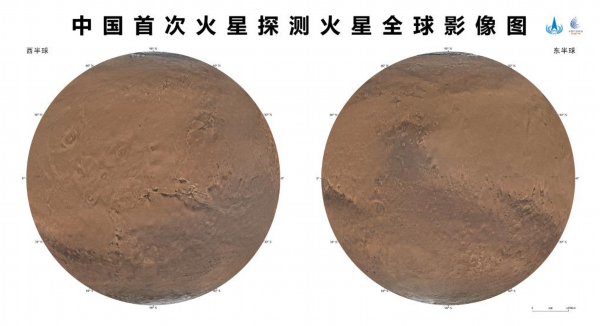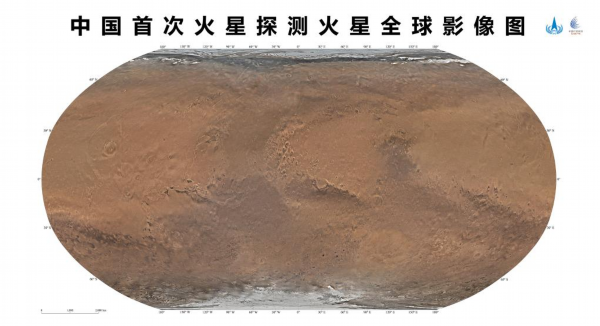
This photo released on April 24, 2023 shows the orthographic projection of the eastern and western hemispheres of Mars. The China National Space Administration (CNSA) and the Chinese Academy of Sciences (CAS) on Monday jointly released a series of global images of Mars obtained during China's first Mars exploration mission.
The series of colored images were released at the launch event of the Space Day of China held in Hefei, capital city of east China's Anhui Province.
Processed in accordance with mapping standards with a spatial resolution of 76 meters, the images include the orthographic projection of the eastern and western hemispheres of Mars, the Robinson projection of Mars, and the Mercator projection plus an azimuthal projection of the planet. (CNSA/Handout via Xinhua)
HEFEI, April 24 (Xinhua) -- The China National Space Administration (CNSA) and the Chinese Academy of Sciences on Monday jointly released a series of global images of Mars obtained during China's first Mars exploration mission.
The series of colored images were released at the launch event of the Space Day of China held in Hefei, capital city of east China's Anhui Province.
Processed in accordance with mapping standards with a spatial resolution of 76 meters, the images include the orthographic projection of the eastern and western hemispheres of Mars, the Robinson projection of Mars, and the Mercator projection plus an azimuthal projection of the planet.
According to the CNSA, these images are based on 14,757 image data acquired by a remote-sensing camera on the Tianwen-1 orbiter over eight months from November 2021 to July 2022.
China's Tianwen-1 mission, consisting of an orbiter, a lander and a rover, was launched on July 23, 2020 and entered the orbit of Mars after 202 days of flight.
The lander, carrying the rover Zhurong, touched down on May 15, 2021 in the southern part of Utopia Planitia, a vast plain in the northern hemisphere of Mars. Zhurong drove down from its landing platform to the Martian surface on May 22, starting its exploration of the red planet.
"The global images of Mars will provide a better quality base map for Mars exploration and scientific research," said Zhang Rongqiao, the chief designer of China's first Mars exploration mission.
"It is an important contribution that Tianwen-1 has made to human deep space exploration," he added.
Zhang noted that starting from May 1 this year, the scientific data of Tianwen-1 will be open to the world.
The research team has also identified a large number of geographical entities near the landing site from high-resolution images of Mars. The International Astronomical Union has named, according to relevant rules, 22 of the geographical entities after the historical and cultural villages and towns in China with a population of less than 100,000.
"The scientific exploration data obtained by the Tianwen-1 mission will make a contribution to human's in-depth knowledge of Mars," the CNSA said.
According to the CNSA, the Tianwen-1 orbiter had achieved global remote sensing detection on Mars by June 29, 2022. So far, it has been operating for more than 1,000 days in good condition and continuing to accumulate remote sensing raw data. The rover Zhurong, currently in dormancy, traveled 1,921 meters on the red planet.

This photo released on April 24, 2023 shows the Robinson projection of Mars. The China National Space Administration (CNSA) and the Chinese Academy of Sciences (CAS) on Monday jointly released a series of global images of Mars obtained during China's first Mars exploration mission.
The series of colored images were released at the launch event of the Space Day of China held in Hefei, capital city of east China's Anhui Province.
Processed in accordance with mapping standards with a spatial resolution of 76 meters, the images include the orthographic projection of the eastern and western hemispheres of Mars, the Robinson projection of Mars, and the Mercator projection plus an azimuthal projection of the planet. (CNSA/Handout via Xinhua)

This photo released on April 24, 2023 shows the Mercator projection plus an azimuthal projection of Mars. The China National Space Administration (CNSA) and the Chinese Academy of Sciences (CAS) on Monday jointly released a series of global images of Mars obtained during China's first Mars exploration mission.
The series of colored images were released at the launch event of the Space Day of China held in Hefei, capital city of east China's Anhui Province.
Processed in accordance with mapping standards with a spatial resolution of 76 meters, the images include the orthographic projection of the eastern and western hemispheres of Mars, the Robinson projection of Mars, and the Mercator projection plus an azimuthal projection of the planet. (CNSA/Handout via Xinhua)





